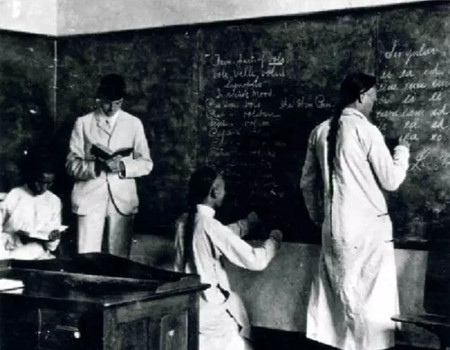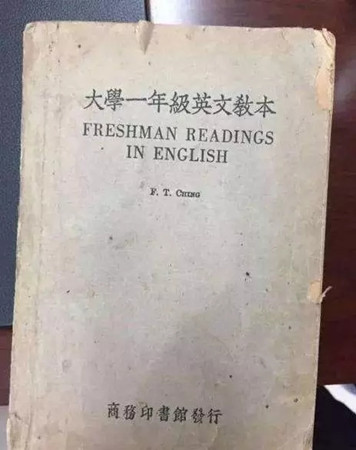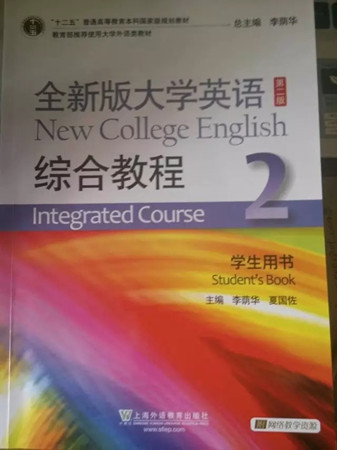Peking University, April 16, 2017: After the Opium War, as the communications between the Qing government and foreign countries became more and more frequent, the importance of English in diplomatic negotiations gradually came to be noticed. In 1862, in order to overcome the language barrier, the Qing government established Imperial Tung Wen College in the Ministry of Foreign Affairs.
In the early twentieth century: Probing for direction
In 1900, Imperial Tung Wen College was incorporated into the first modern national university, the Imperial University of Peking, which changed its name to Peking University two years later. At its inception, it offered language courses for English, French, Germany, Russian and Japanese.

The class in Imperial Tung Wen College
Mao Dun entered Peking University in 1913. Speaking of experiences in learning English when he first came to college, he recalled, “At that time we didn’t approach English step by step. Instead of starting from the rules of pronunciations, we directly skipped to the study of individual words. And every day we wrote words from memory and recited articles in textbooks.” Such condition was changed by a young American teacher. He introduced the plays of Shakespeare to them, starting with Macbeth, then moving on to Merchants of Venice and Hamlet.
In 1917, Hu Shi returned to China and taught at the Department of English at PKU. Drawing experiences from America, he set up faculty meetings and English literature seminars, and also recruited many native English speakers to teach at PKU.
By this time, the Department of English had set up various courses including rhetoric, translation, English poems, operas, nineteenth-century prose and European literary classics, etc., and began to orient the department towards literature. Though it was more advanced compared with Imperial Tung Wen College, the deficiency of teachers and limited resources of courses still remained unresolved.
From the 20s to the 90s: The circuitous process of development of public English classes
In 1919, Hu Shi was appointed as head of the English Department. In 1932, departments of English, French and Germany were merged into the Department of Western Literature. In the 1920s and 1930s, the English Department assembled many renowned scholars such as Lin Yutang, Xu Zhimo, Yu Dafu, Liang Shiqiu, Zhu Guangqian, etc. Consequently, English teaching reached a very high level at that time.
In 1938, after Peking University, Tsinghua University and Nankai University moved southward in succession, these three universities jointly established the National Southwest Associated University in Kunming. Many erudite professors once taught at the Department of Foreign Languages, and Chen Futian, the head of this department, was obviously one of them.

Freshman Readings in English
The Freshman Readings in English chiefly edited by him collected 43 classic articles written by renowned authors worldwide, and encompassed a wide range of literary genres such as novel, prose, argumentative essays and biography. While studying these classics, what’s more important than the acquirement of English reading skills was to pass on the profound humanistic concerns and moral sentiments contained in these works.
In 1946, after the anti-Japanese war, the National Southwest Associated University disintegrated. In the early 50s, the public English teaching and research section was founded to take charge of English courses for the non-English major undergraduates.
During the 1960s and 1970s, the prevalent educational slogan was“never leave behind a single one of thebrothers of our class” , therefore English teaching paid less attention to the uniqueness of individuals and all students were measured by the same standards. After the reform and opening-up, PKU adjusted some policies in English studying, and since then the completion of English education has become an imperative for graduation .
In the twenty-first century: New century, new demands
Since the twentieth-first century, as the number of students at PKU was quickly increasing, in order to improve the teaching quality and efficiency, the public English courses were taught in the Literature and History Building where plentiful small classrooms were available. With the development of internet technologies, the online College English Teaching Platform was put into use, and many multimedia classrooms were built in the Literature and History Building.
Last autumn, in response to students’ generally improved English abilities and increasingly personalized learning needs, PKU carried out a comprehensive reform in public English courses. It transformed the English courses from a comprehensive course into different special courses with various themes and contents, which could provide more choices for students harboring different expectations.

New College English
As the head of current College English Curriculum Reform, Li Shujing, vice president of the School of Foreign Languages, says that the English study at PKU is never test-oriented. Instead, it has always been trying to lay a solid foundation for students in the basic knowledge of English, and striving to enhance their abilities of applying English. Besides this, English study is an important element of general Education, as the president of PKU put it, “we cultivate students who are to lead the future.”
Written by: Yin Xin
Edited by: Hu Rong, Xu Liangdi
Source: PKUYouth (in Chinese)